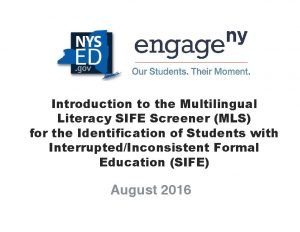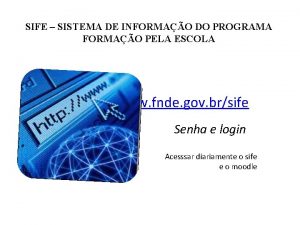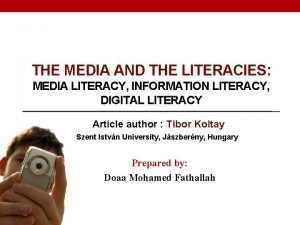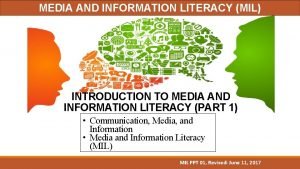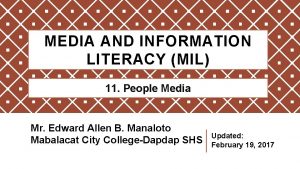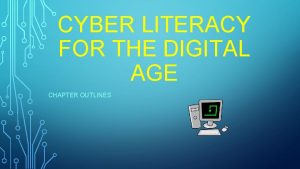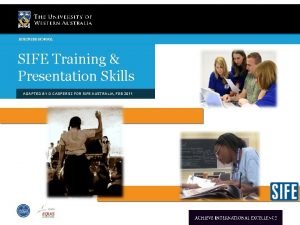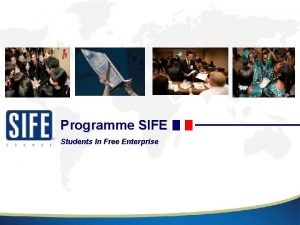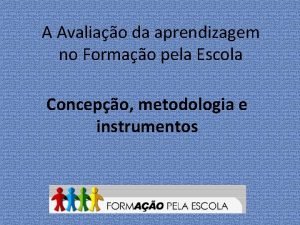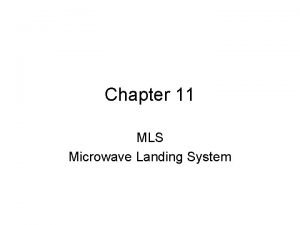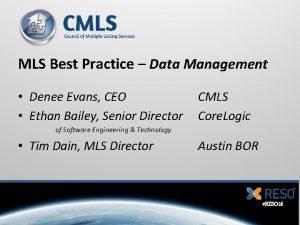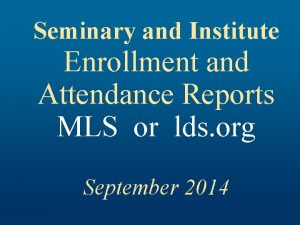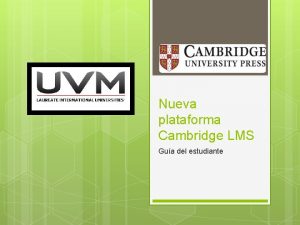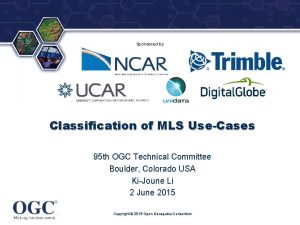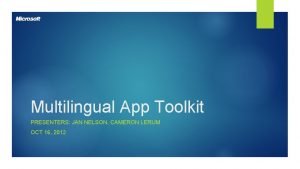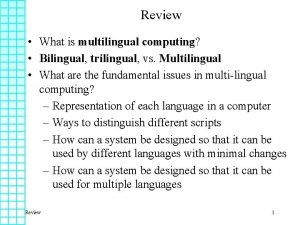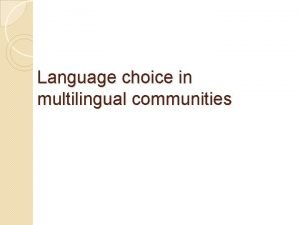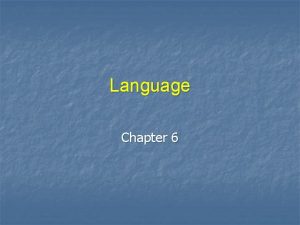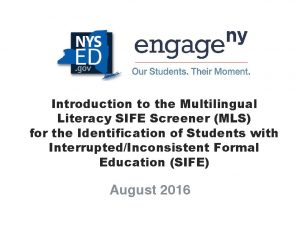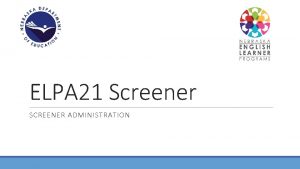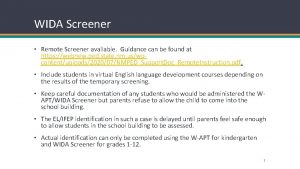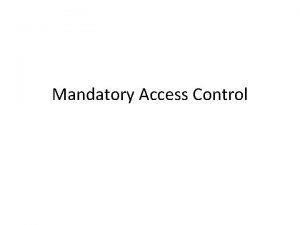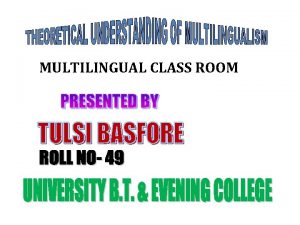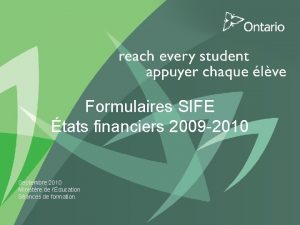Introduction to the Multilingual Literacy SIFE Screener MLS






















- Slides: 22

Introduction to the Multilingual Literacy SIFE Screener (MLS) for the Identification of Students with Interrupted/Inconsistent Formal Education (SIFE) August 2016

Goals for this Presentation 1. To orient and provide basic information about general tools that schools and districts will use to identify and to facilitate program instruction for SIFE. 2. To identify key components of the Multilingual Literacy SIFE Screener (MLS), what it measures, and resources for administration. 2

Important Notes 1. A student must be identified first as an ELL before being identified as a SIFE. 2. The MLS is to be used primarily for the identification of SIFE. 3

Screening, Identification, and Placement of SIFE How can different assessments help to understand SIFE and place them appropriately? 1. HLQ: Administer the NEW Home Language Questionnaire (HLQ) to all newly enrolled students. The new HLQ includes a definition and provisions for the identification of SIFE. Key Question: Is the student’s home or primary language other than English? 2. Individual Interview: Qualified personnel conduct an interview in English and in the home language with the student. This includes reviewing documents, prior assessments, and academic experience. An assessment of the student’s abilities and/or work samples determines the student’s literacy and math level in his/her home language. Results may assist in SIFE determination. Key Question: Is this student a potential SIFE? 4

Screening, Identification, and Placement of SIFE 3. NYSITELL: Student is administered the New York State Identification Test for English Language Learners (NYSITELL) Key Question: What is the level of English proficiency for the student and what kinds of services does he/she need? NOTE: If a student was identified as a potential SIFE during the individual interview, qualified personnel administer the SIFE Oral Interview Questionnaire. 4. SIFE Oral Interview Questionnaire: Student is administered the SIFE Oral Interview Questionnaire Key Question: What can I learn about the student’s family and home background, education history, personal language, and literacy practices and interests? NOTE: A student must be identified first as an ELL before being identified as a SIFE. 5

Screening, Identification, and Placement of SIFE 5. MLS: Student is administered the MLS (See slide 10) to determine literacy in the home language Key Question: Which potential SIFE are at, below, or above grade level in reading comprehension in their home language? What can I learn about skills to target in reading comprehension? 6. Writing Screener: Student is administered the Writing Screener (See slide 20) in their home language Key Question: What are the student’s basic writing skills in his or her home language? NOTE: Ongoing informal assessment of student should take place to ensure proper program placement. Performance-based assessment and portfolio assessment are two commonly used informal methods. Having these records will make it easier when questions of program placement, special services, and grading arise. 6

The Six Steps of SIFE Identification 1 2 3 4 5 6 Administer HLQ Conduct Individual Interview Administer NYSITELL Administer SIFE Oral Interview Questionnaire Administer Multilingual Literacy SIFE Screener Administer Writing Screener Ongoing informal assessment of student must be carried out to ensure 7 proper program placement.

SIFE Oral Interview Questionnaire Purpose: What can I learn about the student’s family and home background, education history, personal language and literacy practices, and interests? ü Remember that the Questionnaire should be administered by qualified personnel per CR Part 154. This Questionnaire is required by NY State and provides 8 information about students in their home language.

Sample Questions from the Oral Interview Questionnaire Benchmark #2: Education History 9

Multilingual Literacy SIFE Screener (MLS) The MLS is: Ø A multilingual set of assessments used to inform teachers and administrators of the home-language literacy skills their students bring with them when they begin schooling in New York State. Ø A semi-adaptive online Screener that reflects current literature-based curricula and didactic principles from students’ home countries for grades 3 through 9. Ø An additional tool to be used in determining if a newly arrived English Language Learner is designated as SIFE. The MLS is NOT a writing test. The MLS reports can be a valuable introductory tool to plan instruction for students above 3 rd grade. 10

The MLS is available in the following languages: : Reading Comprehension • • • Arabic Bangla Chinese Simplified English Haitian Creole Maay S'gaw Karen Spanish Urdu Vocabulary • • Chinese English Spanish Urdu 11

Why the Multilingual Literacy SIFE Screener? The MLS is: ü A uniform assessment screener to be used throughout the state ü Research-based and created by experts at the Research Institute for the Study of Language in Urban Society (RISLUS) Language Lab at CUNY Graduate Center ü A culturally competent assessment that supports multilingual students ü A way to provide a more in-depth understanding of language competencies by drawing on home language and content knowledge ü Helps educators identify SIFE levels in 3 rd grade and above and also which students are below 3 rd grade to support further diagnostic assessment and instructional planning 12

MLS Report Excerpt— 3 rd Grade Level Student: 1 Reading Level: 3 Reading Comprehension Results This student can read at an Advanced 3 rd Grade level in their home language, Arabic. Upon completion a reader at the advanced third grade level can: Ø Distinguish the difference between non-literary and literary texts and between functional and fictional texts through the title and the accompanying pictures and drawings. Ø Know the purpose of the non-literary texts, which is to provide scientific information, instructions, and explanations. Ø Know the narrative texts formula and organization using the connectors, time adverbs like now, next, after, and the use of the singular and plural forms. Ø Know the general features of informational texts, which to present and discuss facts such as: living organisms are divided into four types, or electricity is extracted from. . . etc. Ø Understand separate the main ideas from the details in the texts they read. Ø Recognize and understand vocabulary related to shape and height, body parts, colors and names of animals; and verbs such as “bring” “receive” “prefer” “welcome” “walk” “remember”. . . Ø Identify synonyms 13

MLS Report Sample 14

MLS Administration / Log in Key Considerations ü Use only Firefox and Chrome web browsers. DO NOT USE MICROSOFT INTERNET EXPLORER or SAFARI ü Since this is computer adaptive, students will be working at different paces. Plans should be made for students who finish early. ü Students will require headphones to take the test, a computer, and a quiet space. ü There is no time limit requirement (scheduling should be considered). 15

Initial Log in and Application Access at: http: //mld. gc. cuny. edu/ Refer to the Quicksheet for further instructions 16

Applying for an Account 1. To apply for an account and get credentials, go to http: //mld. gc. cuny. edu/ 2. Click the link “Apply for an Account” at the bottom of the screen when you access the MLS Homepage. 3. After clicking on the link, the registration screen will appear. 4. In order to register for an account and receive credentials, fill out the form. 17

Site Registration for the MLS ü When filling out the form, each school site only has one set of credentials: • a login and password to administer the test and • a login to print test result reports. ü After registering login information will be sent to the indicated e-mail by technical support. ü For any problems applying for an account or with any other feature of the MLS, please contact technical support at: mld. email. server@gmail. com ü It is important to apply for an account IN ADVANCE of administering the tests. We recommend 3 days before the first administration of the assessment. 18

Key Steps to MLS Log in 1 2 • School name: Enter the name of your school (e. g. P. S. 000 – The Barack H. Obama School for Government Studies). • Email: Enter the official email that the school site MLS administrator will use. 3 • Please use your official NY State or school email address. The credentials will be emailed to this address after submitting the registration form. 4 • Login: Enter your school site’s unique BEDS code. This will be the username for MLS test administration. 5 • Enter and Confirm Proctor’s Password : Create and enter a password for MLS proctors. Keep this in a safe location. 6 • Enter and confirm the Administrator’s password field : Create and enter a different password for MLS administrators who will view the literacy skills assessment reports. Keep this in a safe location. 19

Writing Screener The main purpose is to: Ø Learn about a student’s writing skills as a baseline in the home language. Ø The Writing Screener should be administered in the student’s home language. A math screener will be forthcoming. 20

Additional Guidance ü Choose the assessments wisely and follow the state guidelines for administration. ü Triangulate your data points – what does each diagnostic tell you? How do these provide a picture of your students and prioritize placement, instruction and tailor supports? ü Consider additional informal sources of information such as transcripts and anecdotes from other teachers or family members. ü Be cautious about making assumptions about what a student can or cannot do. Use these assessments and other teachers and resources to guide your thinking. 21

Additional questions? For more information on SIFE, see http: //www. p 12. nysed. gov/bilinged/SIFE. html Please send questions or comments to the Office of Bilingual Education and World Languages. OBEFLS@nysed. gov OR The Regional Bilingual Education Resource Network (RBERN) 22
 Mls screener
Mls screener Sife fnde
Sife fnde Similarities of media information and technology literacy
Similarities of media information and technology literacy Communication media and information venn diagram
Communication media and information venn diagram People in media examples
People in media examples Cyber literacy for the digital age
Cyber literacy for the digital age Sife trainings
Sife trainings Students in free enterprise
Students in free enterprise Plataforma sife
Plataforma sife Mls ils
Mls ils Mls data management solutions
Mls data management solutions Shrek extreme close up
Shrek extreme close up Lds seminary attendance requirements
Lds seminary attendance requirements Cambridgelms
Cambridgelms Mls fundação
Mls fundação Mls classification
Mls classification Mls rezistence
Mls rezistence Multilingual e-learning
Multilingual e-learning Multilingual app toolkit
Multilingual app toolkit Multilingual computing
Multilingual computing Code switching and code mixing
Code switching and code mixing Multilingual state
Multilingual state Renfrew hypothesis definition ap human geography
Renfrew hypothesis definition ap human geography
